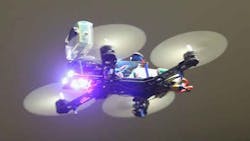Drone Registration Rules Ready for Takeoff
WASHINGTON — That drone under the Christmas tree? If you are a U.S. resident, you will need to register it by February 19 or face a possible fine.
Rules released Monday by the Federal Aviation Administration require registration of small unmanned aircraft weighing more than 250 grams (0.55 pounds) and less than 25 kilograms (55 pounds), including payloads such as on-board cameras.
The registration fee is $5, but in an effort to encourage people to register quickly, the FAA will waive the fee through January 20.
"Make no mistake: unmanned aircraft enthusiasts are aviators, and with that title comes a great deal of responsibility," U.S. Transportation Secretary Anthony Foxx said in a statement. "Registration gives us an opportunity to work with these users to operate their unmanned aircraft safely. I'm excited to welcome these new aviators into the culture of safety and responsibility that defines American innovation."
U.S. authorities concerned about safety implications of drones announced plans earlier this year to require registration.
For recreational drone pilots in the United States, the flight rules are clear: no higher than 400 feet (120 meters), always within sight and nowhere near an airport without prior permission.
Owners will be able to use a streamlined online registration system, using a unique identification number for their drones. The registration is valid for three years.
Civil penalties for failing to register can go up to $27,500.
The Consumer Technology Association, which represents electronics startups and manufacturers, welcomed the streamlined registration process but objected to the new fee.
“We disagree with the decision to impose a five-dollar registration fee — a ‘drone tax,’ which will hamper registration and discourage compliance,” said Douglas Johnson, a vice president of CTA, formerly known as the Consumer Electronics Association.
“With the federal rule’s arrival, the administration must now focus on two critical tasks: informing consumers about the registration program and avoiding unnecessary and duplicative registration proposals at the state and local levels.”
The association said it expects the U.S. market will approach $105 million in revenue, up 52% from a year ago, with unit sales growing 63% to 700,000.
Copyright Agence France-Presse, 2015.
About the Author
Agence France-Presse
Copyright Agence France-Presse, 2002-2025. AFP text, photos, graphics and logos shall not be reproduced, published, broadcast, rewritten for broadcast or publication or redistributed directly or indirectly in any medium. AFP shall not be held liable for any delays, inaccuracies, errors or omissions in any AFP content, or for any actions taken in consequence.
